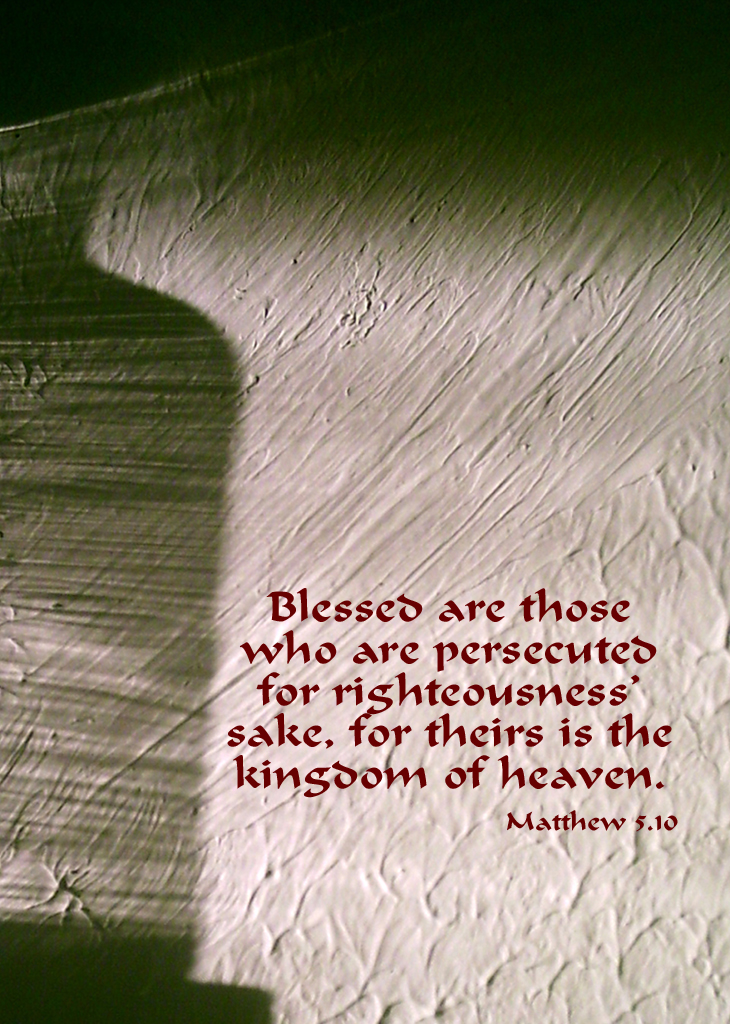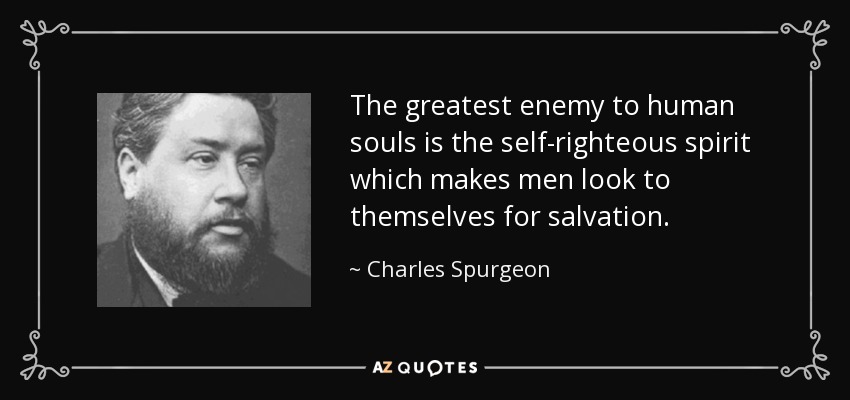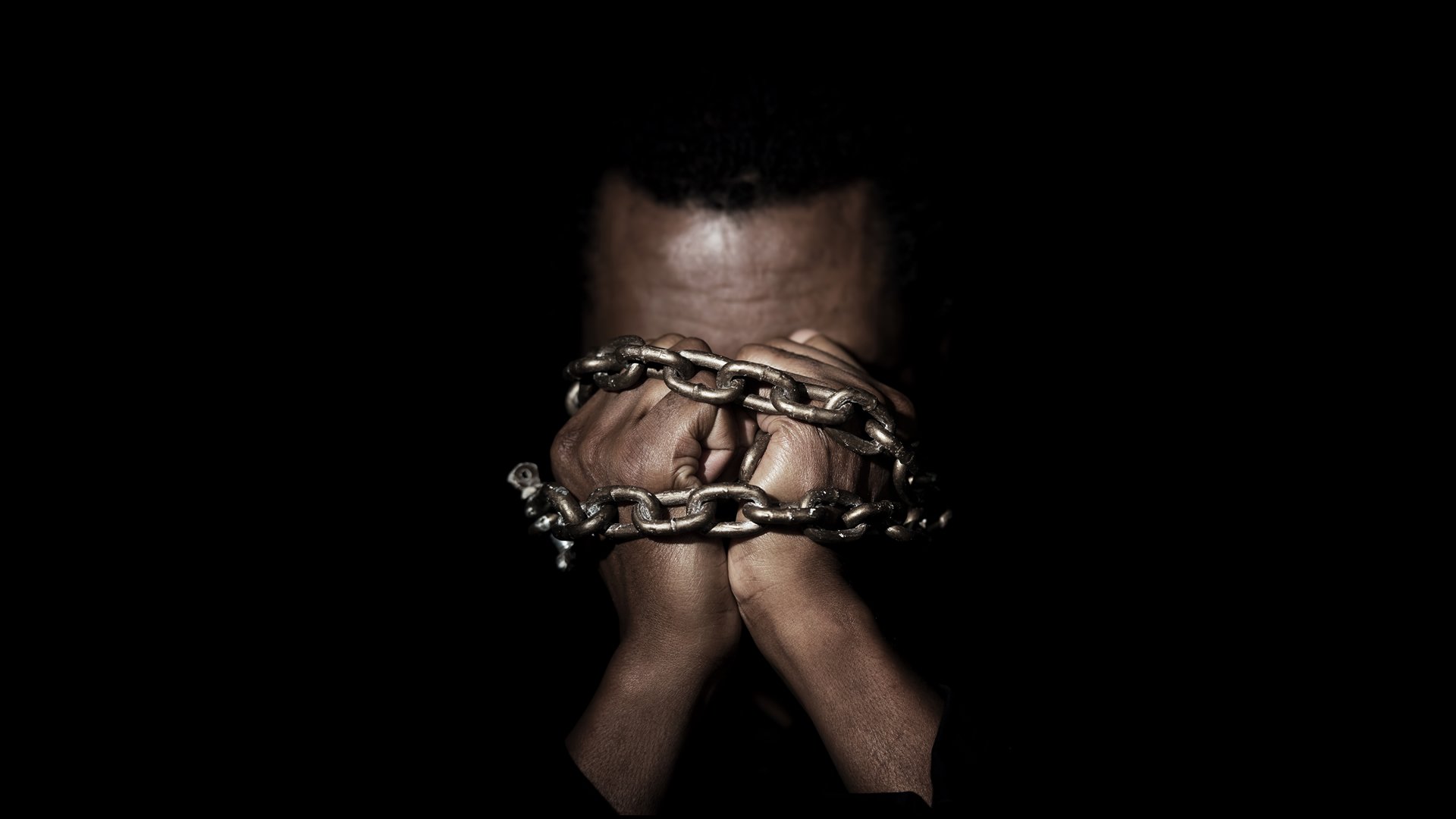Lenten Devotional – THURS, Mar 25: KINGDOM of HEAVEN
We heard this phrase earlier in the Beatitudes. The Kingdom of Heaven is another way of saying God’s Kingdom. It means that you ‘who are persecuted for righteousness sake’ — from Matthew 5:10— belong to God. God has adopted, embraced, welcomed and claimed you. The Message version of the Bible says, ‘The persecution drives you even deeper into God’s kingdom.’
The Beatitudes have been building up, and by the time we get to the end of them, we ought to identify ourselves as being claimed by God. Even when we’re imperfect and messy, we’re part of the Kingdom.
If you look at the people whom Jesus chose for companions, it’s a great argument that the Kingdom of Heaven isn’t full of winners and heroes and saints. It’s full of folks we’d probably recognize. And maybe we’d avoid inviting some of those rough characters to dinner, yet Jesus would open the door and pull up a chair for everyone.
Due to the awkward phrasing, readers might mistakenly interpret the Kingdom of Heaven in this blessing to mean that the persecuted are headed away from Earth, being called to some far-off divine paradise in the skies, beyond death. Yet readers would be mistaken.
Grammar changes the meaning! The Forerunner Commentary writes, “The word “of” denotes possession, not location: It is Heaven’s Kingdom … it is the Kingdom of Heaven, not the Kingdom in Heaven, although its headquarters is in heaven.” A different scholarly source adds, “This phrase, the kingdom of heaven, is used thirty times by St. Matthew. The other evangelists, and St. Paul, term it generally, the kingdom of God, and sometimes, the kingdom of Christ. These different phrases mean the same thing.” The writers of Matthew and other Gospels used these terms interchangeably.
In other words, those who receive this Beatitude, this blessing, belong to God’s kingdom here. Here on earth. After all, they’re experiencing persecution here and now. They belong in the company of God’s loving presence among the people living on earth here and now.
Here and now. Not later. Not somewhere else. After all, God is among us, with us, always. And we’re right next to Godself, in God’s presence, all the time, even if we don’t know it. God has wrapped the Kingdom of Heaven around us. — Rev Gail
MEDITATIONS:
A new world. A better world than has ever been seen. There, you are not what you are born but what you have it in yourself to be. A kingdom of conscience, of peace instead of war, love instead of hate. That is what lies in the end of a crusade. A kingdom of heaven. — Ridley Scott
Therefore, the kingdom of heaven is both now and not yet. It is present and it is future. — Tim Barnett
Challenge of Question: Do you feel like you belong to Heaven? Is it harder to believe that you, yourself, are claimed by Heaven or to believe that other people are so claimed?
Lenten Devotional-WED, Mar 24: SAKE
The other part of this Beatitude’s phrase is for righteousness’ sake. We’re acting for a cause. We’re choosing a sacred and holistic motivation.
What, then, falls into the realm of being for righteousness’ sake? It’s the motivation in response to ‘Love God, and love thy neighbor as thyself. It’s all those cares and causes that focus on the equitable and sustainable wellbeing of all humans as well as the whole natural world (ie, Creation). For righteousness’ sake is the purpose that drives our choices and prompts our actions.
Wouldn’t it be wonderful if we could always point to being pure-of-heart in our motivations? If our righteousness’ sake was aimed at a faith-based objective? Being pure-of-heart, as discussed in an earlier passage in the Beatitudes, describes being whole-hearted and single-minded with a focus on ethical reasons underlying words and deeds.
Yet we’re human, and God knows, we aren’t perfect. We’re works in progress. We’re trying. Striving. Falling down. Stumbling. Then getting up and trying again.
So be compassionate with yourself, if you don’t feel like you’re always motivated for the right reason, or for the righteous reason, or for righteousness’ sake. Just know that we have an abundance of chances, with every choice and action, to do the next right thing. To incrementally work toward a righteous way of living and being. God will be with us all the way, the primal motivator underneath all the other causes we think of as being for righteousness’ sake. — Rev Gail
MEDITATIONS:
If you don’t have a righteous objective, eventually you will suffer. When you do the right thing for the right reason, the right result awaits. — Chin-Ning Chu
Seeking truth and goodness and righteousness is part of the quest for wisdom. The more this quest is part of our lives, the more vigilant we will be, and the more active will be our discipleship. — Joseph Prior
If I pursue righteousness, I will not attain righteousness; but if I give up on trying to be righteous and rather look to Christ by faith, righteousness will be produced in my life as a natural byproduct of my relationship with Him. — Ty Gibson
Challenge or Question: What righteous sakes —causes— show up as significant commitments in your life, as measured by your financial contributions or donations of time, energy, and attention?
Lenten Devotional – TUE, Mar 23: RIGHTEOUSNESS
We tackled the word difficult word ‘righteous’ earlier in this series of reflections. As a brief reminder, righteousness means, in simple terms, to act and live in right relationship. Let us clarify righteousness as seeking a ‘right relationship’ with Godself in the context of this Beatitude’s blessing.
Well, if a person is living, behaving, choosing, and speaking in ways that honor ethics and core values – righteously — why would they be persecuted? The late Civil Rights activist and Congressional representative John Lewis famously urged people to make ‘good trouble, necessary trouble.’
Given that framework, we can imagine that standing up for your beliefs, getting involved with a cause that motivates you to make others uncomfortable, provokes a reaction. You may simply be acting on your principles, not attempting to convert others to your way of thinking, but the choice to engage in any form of activism or advocacy can put you in the position of being a target. Any act to make a difference, to live and act righteously, and not complacently, may draw someone else’s criticism or judgment.
Yet another saying is ‘silence is violence’. Thus, if the choice is to do nothing and allow harm to continue, or do something and help create healing change, we are called to act.
Simply caring enough to choose or act — for righteousness sake — means you’re going to make some ‘good trouble, necessary trouble.’ And someone else will object!
Back to persecution: you didn’t start the persecution. Nor did you invite it. Yet it’s happening. Or has already happened. Or will happen.
Maybe your level of involvement in change-making is restricted to personal acts such as financially supporting organizations, voting your conscience, or writing to government representatives on issues that draw your concern. Maybe you stay private and keep to the background.
Or maybe you’re public in your support for others. Righteousness, after all, is usually expressing care for the wellbeing of others. You share your choices and views. Volunteer for an agency or organization that responds to problems about which you are passionate. Post on social media. Document. Bear witness. Report. Reach out. Get involved. Put yourself on the line.
Either way, in this small-town world in which we live —and this technologically-connected environment in which we function—often our views and choices become known to others. Along the way, somehow, we become targets for persecution, because we care.
We explored, yesterday, that ‘persecution’ might include a range of experiences. It could involve anything from being socially bullied and criticized to being arrested and imprisoned. Depends on where you live and who took exception.
Regardless of whether persecution was intended to reach you, or you were a bystander swept into the event or experience, the result is hurtful and harmful. It’s a tough experience. Persecution leaves a mark, either inside — emotionally and psychologically—or on your wellbeing physically and socially. Victim-blaming can also reverse the attention, so that people hold you responsible for what happens to you, instead of looking at the perpetrators.
What is our consolation and comfort in response to persecution? Even for righteous reasons? The Beatitudes have already extolled the resilience of people who have felt powerless, hurt, sad, marginalized, invisible, isolated, imprisoned, starved, excluded. The Beatitudes describe the tenacious nature of human beings. And envision that the world in which we live, and the people we meet, will offer the resources we need to cope.
We are not alone. God shows up, not just as an invisible conversation partner on the other end of a prayer to heaven, but as the muscular and tangible love and justice and compassion we receive in our lifetimes.
Being the victim or target of persecution, even due to faith, isn’t okay. God doesn’t desire for us to suffer or to be tested, as if we’re in some sort of trial, passing an exam, or in the process of being refined and perfected through loss and trauma.
Bluntly, you don’t have to be persecuted to be righteous. The Beatitudes aren’t an instruction manual on how to become righteous. It’s the opposite. It’s recognition that being righteous can be dangerous. And yet we’re already choosing to be those people who care—and act out of care—for ethical and spiritual reasons. For righteousness sake.
Along those lines, please know that God doesn’t make persecution—and other damaging things—happen. Rather God shows up in the response to such experiences. God’s intentions for us are creative, good, loving, healing, holistic, and merciful.
Persecution is definitely a human-made condition. A social challenge.
Godself knows that the world isn’t perfect. After all, people aren’t perfect. People are part of God’s creation, and creation is already a living system full of messy beings. Also, as humans live in society together, people create systems and institutions that embody and perpetuate social wrongs and subtle forms of persecution. And Godself cannot protect and shield us from living in this world. God doesn’t promise—on earth—an end to suffering. We’re not exempted from the full experience of being mortal.
In fact, sometimes those who are persecuted are also embodying God’s response to others. We’re showing up for someone else, and in the course of doing so, we’re becoming the ones who need someone else’s help, too.
Yet in our faith, we believe God walked among us, incarnate as Jesus, to know us better. Godself abides with us, even now, as Spirit. God knows firsthand what it feels like to be a vulnerable human being. To do the right thing. To stand for what you believe in. To speak and act for the wellbeing of others. And to be questioned, invalidated, challenged, judged, ostracized or tormented for it. Even killed over it.
God didn’t start the persecution. Yet God is accompanying you on this righteous—right relationship— journey you’re taking. Into fires. Through trials. Beyond judgment. On the streets. In the hospital waiting room. On the Facebook page. In prison. Along the trail. At home. Among the Twitter feeds. In the classroom. Behind the wheel. At the shop. On the mountain. Past death itself to where love lives.
What is the ultimate force behind what we do for righteousness’ sake? Love. Holy love. Love’s alive, here, among us. — Rev Gail
MEDITATIONS:
If a man perfectly righteous should come upon earth, he would find so much opposition that he would be imprisoned, reviled, scourged, and in fine crucified by such, who, though they were extremely wicked, would yet pass for righteous men. — Plato
The humblest citizen in all the land, when clad in the armour of a righteous cause, is stronger than all the hosts of error. — John Dos Passos
Righteousness is the truth revealed and working in you. — Sherry White
Desire of righteousness is preceded by repentance, accompanied by humility, and followed by works of mercy. — Gaultier
Challenge or Question: Have you ever needed to respond to a situation wherein someone else was being persecuted? How did you respond?
Lenten Devotional – MON, Mar 22: Persecuted
Commentators connect this week’s blessings with the earlier Beatitude passage about peacemakers. All the blessings are integrated. One scholar writes, ‘Here again there is a profound significance in the order. The work of the peacemakers is not a light and easy work.’ When believing in, and working for, a righteous or just cause, a person may suffer ridicule or harm.
What does persecution mean? Why would we ever put ourselves in a position to experience it?
Perhaps the threat or damage is verbal or physical, psychological or emotional, personal or social. It can come in the form of insults and lies, gossip and judgment. It may mean torture or bullying.
The reason for which one experiences the persecution is integral to the blessing. The reason — the cause that speaks to our values — is the only reason we’d risk anything that could be called persecution.
The people who are persecuted have found something for which they’re willing to take risks. They are folk choose uncommon, even revolutionary paths, in the sense of going against public opinion. They’re committed.
They’re the family, friends, neighbors and strangers we’ve met in earlier Beatitudes. The pure-hearted, who are single-minded and whole-hearted. The meek, who are kind but strong when they choose to hold their ground.
This state of being includes those who are passionate about their faith, and what it calls them to do for other people we also see in the Beatitudes: the hungry, the poor, the sorrowing, the powerless, the marginalized, the vulnerable, the hurt, the broken. Do you recognize yourself in this description, as one who will stand up for others, because of your faith-based values? — Rev Gail
MEDITATIONS:
Our wretched species is so made that those who walk on the well-trodden path always throw stones at those who are showing a new road. ― Voltaire
They can take our homes, our possessions. Our families. Our lives. They can drive us out, like they’ve driven us out before. They can humiliate us and dehumanize us. But they cannot take our thoughts. They cannot take our talents. They cannot take our knowledge, or our memories, or our minds. ― Amy Harmon
Challenge or Question: What causes require that you put yourself at risk, either exposed to public opinion or in some other form? Have you ever felt persecuted? Or perhaps, upon reflection, have you ever participated in the persecution of another person?
Lenten Devotional – Sun, Mar 21: Blessed
This week’s texts:
Matthew 5:10-12 (NRSV)
10 “Blessed are those who are persecuted for righteousness’ sake, for theirs is the kingdom of heaven.
11 “Blessed are you when people revile you and persecute you and utter all kinds of evil against you falsely[b] on my account. 12 Rejoice and be glad, for your reward is great in heaven, for in the same way they persecuted the prophets who were before you.
Matthew 5:10-12 (The Message)
10 “You’re blessed when your commitment to God provokes persecution. The persecution drives you even deeper into God’s kingdom.
11-12 “Not only that—count yourselves blessed every time people put you down or throw you out or speak lies about you to discredit me. What it means is that the truth is too close for comfort and they are uncomfortable. You can be glad when that happens—give a cheer, even!—for though they don’t like it, I do! And all heaven applauds. And know that you are in good company. My prophets and witnesses have always gotten into this kind of trouble.
BLESSINGS:
Today we explore how people adapt the idea of the Beatitudes in contemporary language and contexts. This example can start your thoughts about what blessings you see in the ‘upside down’ Kingdom of God. They are written by Rev Nadia Bolz-Weber:
Blessed are the agnostics. Blessed are they who doubt. Those who aren’t sure, who can still be surprised.
Blessed are they who are spiritually impoverished and therefore not so certain about everything that they no longer take in new information.
Blessed are those who have nothing to offer. Blessed are they for whom nothing seems to be working.
Blessed are the pre-schoolers who cut in line at communion.
Blessed are the poor in spirit. You are of heaven and Jesus blesses you.
Blessed are those who mourn, for they will be comforted. Blessed are they for whom death is not an abstraction. |Blessed are they who have buried their loved ones, for whom tears are as real as an ocean.
Blessed are they who have loved enough to know what loss feels like.
Blessed are the mothers of the miscarried.
Blessed are they who don’t have the luxury of taking things for granted any more.
Blessed are they who can’t fall apart because they have to keep it together for everyone else.
Blessed are the motherless, the alone, the ones from whom so much has been taken.
Blessed are those who “still aren’t over it yet.”
Blessed are they who laughed again when for so long they thought they never would. Blessed are those who mourn.
You are of heaven and Jesus blesses you.
What blessings would you add to the Beatitudes? Who has surprised you, in your lifetime, as a child of God? — Rev Gail
MEDITATIONS:
I imagine Jesus standing here blessing us all because I believe that’s his nature. Because, after all, it was Jesus who had all the powers of the universe at his disposal but did not consider his equality with God something to be exploited. Instead, he came to us in the most vulnerable of ways, as … flesh-and-blood … As if to say, “You may hate your bodies, but I am blessing all human flesh. You may admire strength and might, but I am blessing all human weakness. You may seek power, but I am blessing all human vulnerability.” This Jesus whom we follow cried at the tomb of his friend and turned the other cheek and forgave those who hung him on a cross. Because he was God’s Beatitude—God’s blessing to the weak in a world that admires only the strong. — Nadia Bolz-Weber
Challenge or Question: Identify a blessing within your life. One aspect of your life for which you are grateful. Give thanks for it. Say a prayer, write it in a journal, or light a candle to acknowledge this blessing.




